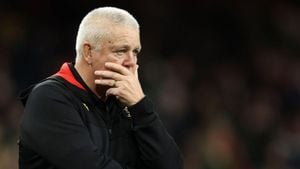Robert Habeck, the Green Party's candidate for the upcoming 2025 German Federal Election, is making waves with his recent television appearances and campaign strategy as tensions rise among competing political factions. With Germany facing significant economic challenges, Habeck is not only defending his party's stance on immigration but also aiming to carve out his identity as a chancellor candidate.
During the ZDF program "Was nun, Herr Habeck?", the Green candidate came under scrutiny as he faced tough questions, particularly on the party's migration policies. Habeck's responses highlighted his commitment to distancing the Greens from the far-right Alternative for Germany (AfD). "It is wrong to chase populism," he asserted, emphasizing the need for clarity when engaging with the AfD's shared sentiments with certain factions of the Christian Democrats (CDU). He cited CDU leader Friedrich Merz and Bavarian Minister-President Markus Söder’s strategies as insufficient to curb the growing influence of the AfD.
The AfD has polled around 20 percent, posing substantial competition. Habeck pointed to Schleswig-Holstein's CDU Minister-President Daniel Günther as exhibiting success through “another political culture”—one capable of keeping the AfD out of the regional parliament. The political climate suggests Habeck's party has risen to approximately 15 percent, equaling their Bundestag election results from 2021. "That hasn’t yet been achieved by the other coalition parties," he noted with pride.
Both candidates, Habeck and Alice Weidel of the AfD, were featured separately on ZDF earlier this week, yet their contrasting stances on important issues stood out markedly. Weidel reiterated her party's willingness to negotiate with the CDU but was met with sharp criticism from Habeck, who branded the CDU's reliance on the AfD as politically questionable. He highlighted the risks associated with the CDU’s proposals for border closures, cautioning such policies could jeopardize European solidarity. "Germany relies on other nations, especially when facing potential trade tariffs from the United States," he remarked, hinting at broader economic impacts.
By introducing his 10-point plan on migration, Habeck aims to present proactive integration measures rather than the restrictive policies favoured by the CDU. Rather than border closures, he champions the integration of current residents within the workforce, emphasizing support for refugees and long-term residents. "The integration question has not been asked firmly enough. Too many people leave school without qualifications, and we must focus on bringing these individuals to the working market," he stated.
Facing skepticism about his effectiveness as Minister for the Economy, he defended his management during this economically tumultuous period. Speculation about his capacity to steer Germany away from continued recession looms, but Habeck remains hopeful. "Germany is encountering structural economic crises. I must state it bluntly," he acknowledged. Yet, he countered claims by emphasizing how damage could have been worse without active interventions.
His economic strategy does not shy away from recognizing the failures faced by the previous coalition, pointing fingers at bureaucracy, job creation, and investment opportunities. The criticism he faces seems to be warranted by Germany’s continuing economic struggles as it navigates the repercussions of phasing out Russian gas. He explained, "The exit from Russian gas has been somewhat manageable, but structural problems persist," indicating tensions from exporters globally as U.S. tariffs loom.
Habeck has positioned himself as the 'Bündniskanzler', striving to stabilize the political middle ground by fostering collaboration among differing political factions. His vision transcends rigid party lines and suggests he aims to rebuild trust and consensus by focusing on pragmatic solutions over ideological divides.
He boldly reaffirmed his intent to push for the chancellorship, stating, "We must also want to win; I do so as well." This declaration underlines the competitive spirit alive within the Green campaign amid the looming election, as they prepare to navigate complex voting dynamics.
To counteract concerns over the perception of his past academic work, Habeck asserted his doctoral thesis had been rigorously evaluated, labeling any plagiarism allegations as baseless. This shows his commitment to transparency as the election approaches.
With just weeks to go until Germany's federal elections, Robert Habeck seems poised to challenge not only for his party’s leadership but for the nation’s political future amid swirling critiques and the pressing need for effective governance. The political scene remains intensely competitive, but Habeck’s narrative positions him as both challenger and advocate for the German populace, eager to implement change and reclaim the Green Party’s stakes.



